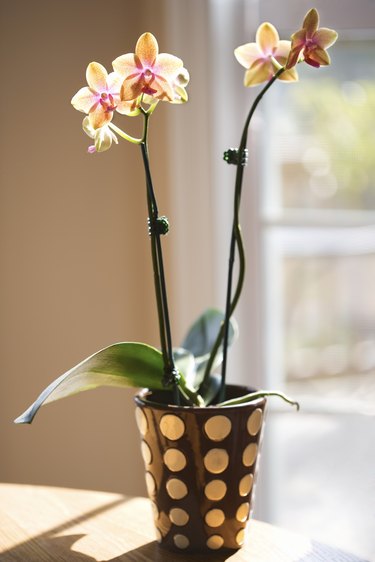Things You'll Need
Water mister
Pot
Orchid mix
Orchid fertilizer

Orchids are beautiful, tropical houseplants but have a deserved reputation as difficult-to-grow prima donnas. Many varieties of orchids are available, but just about all of them require the same basic care. Most orchids are epiphytes, meaning they get most of their water and nutrient needs through aerial roots, which appear as thick, white roots growing on the surface or outside their pots. Three orchid families that are considered good for beginners are the lady's slipper orchids, the cattleya orchids and moth orchids. Provide the basic care for these picky plants, and the chances of having beautiful blooms each year will be greatly enchanced.
Step 1
Keep orchids in temperatures between 60 degrees Fahrenheit at night, 70 to 85 degrees during the day. Orchids do not like the cold. They require at least 10 degrees Fahrenheit difference between day and night temperatures to flower.
Video of the Day
Step 2
Provide bright, indirect light. For best growth, place orchids in a window facing east or west, or a somewhat protected southern exposure.
Step 3
Pour filtered water into their pots until it runs out of the bottom. Allow the orchid dry out before watering again. Over-watering will rot the roots and kill the plant.
Step 4
Mist orchids daily, or keep their pots standing on a tray of damp pebbles. Orchids like 50 percent or higher room humidity.
Step 5
Keep orchids in pots that are slightly small for the plants' sizes. Orchids do best when slightly root bound.
Step 6
Repot orchids every few years when they become too top heavy for their containers, are growing new shoots out of the pots or the potting mix has deteriorated. Replant in a container that is just one size larger than the old pot.
Step 7
Plant orchids in planting mix that is formulated specifically for orchids. Orchids prefer a very loose, porous growing substrate that is mostly bark.
Step 8
Fertilize with a plant food made specifically for orchids during growing periods when the plant is sending out new shoots. Follow the label directions for dosage.
Tip
If an orchid's flower stalk droops, tie it loosely to a tall stake using twist ties.
Video of the Day